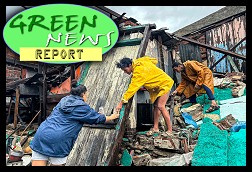
IN TODAY'S RADIO REPORT: Napa earthquake is a warning for CA's nuclear plants; Scott Brown's amazing climate science flip-flop; Another coal plant bites the dust in NC; Cutting emissions will save more money than it costs; PLUS: Fighting drought with a 'salmon cannon'. Yep --- a salmon cannon ... All that and more in today's Green News Report!
Got comments, tips, love letters, hate mail? Drop us a line at GreenNews@BradBlog.com or right here at the comments link below. All GNRs are always archived at GreenNews.BradBlog.com.
IN 'GREEN NEWS EXTRA' (see links below): Japan industry now fighting 'Minimata' toxic mercury treaty it supported last year; Methane bubbles discovered seeping in Atlantic Ocean; UN draft report: irreversible damage from human-caused climate change unless faster action taken; Daming dams - large dams destroy communities; Oil trains compete with grain trains; Which kills more birds - coal or solar? ... PLUS: Climate science geo-engineering pioneer fears it's all about to blow up ... and much, MUCH more! ...
STORIES DISCUSSED ON TODAY'S 'GREEN NEWS REPORT'...
- FLIP FLOP: 2012 Scott Brown vs. 2014 Scott Brown On Climate Change:
- VIDEO: Scott Brown Flips On Climate Change: 'No' It's Not Scientifically Proven (TPM):
Former Sen. Scott Brown (R), now running for Senate in New Hampshire, over the weekend was pretty clear: science has not proven that climate change is real. But back in 2012, when Brown was running for re-election in Massachusetts, he said that he "absolutely" believed climate change is real and that it is a result of both man-made and natural causes. - Nuclear Expert Warns More Earthquake Testing Needed at CA Nuke Plant:
- Diablo Canyon nuclear plant should be closed for quake testing, expert says (AP) [emphasis added]:
A senior federal nuclear expert is urging regulators to shut down California’s last operating nuclear plant until they can determine whether the facility’s twin reactors can withstand powerful shaking from any one of several nearby earthquake faults. Michael Peck, who for five years was Diablo Canyon’s lead on-site inspector, says in a 42-page, confidential report that the Nuclear Regulatory Commission is not applying the safety rules it set out for the plant’s operation. - Former inspector calls for state's last nuclear plant to be closed (LA Times) [emphasis added]:
A new fault --- known as the Shoreline fault --- was discovered just offshore from the plant in 2008. Federal regulators concluded that the plant's current design would be able to stand up to any earthquakes the fault might produce....Damon Moglen, senior strategic advisor with the environmental group, said Peck is "the canary in the coal mine, warning us of a possible catastrophe at Diablo Canyon before it’s too late."...Nuclear Regulatory Commission spokeswoman Lara Uselding said the agency stands by its conclusion that the plant would safely withstand an earthquake. - Diablo Canyon Power Plant (Wikipedia):
It was built less than a mile from the Shoreline fault line, and is located less than three miles from a second fault. - More Than 90 Percent Of Napa Residents Don't Have Earthquake Insurance: Report (Huffington Post Green)
- Cutting Emissions Saves 10x More Than It Costs:
- Study: Cutting emissions pays for itself (MIT News Office) [emphasis added]:
Savings from healthier air can make up for some or all of the cost of carbon-reduction policies.... [J]ust how large are the health benefits of cleaner air in comparison to the costs of reducing carbon emissions? MIT researchers looked at three policies achieving the same reductions in the United States, and found that the savings on health care spending and other costs related to illness can be big — in some cases, more than 10 times the cost of policy implementation. - Cutting Carbon Pollution Saves More Money Than It Costs By Making People Healthier (Climate Progress):
The health benefits of policies that aim to reduce carbon emissions can more than pay for the costs associated with implementing these policies, according to a new study.
...
“If cost-benefit analyses of climate policies don’t include the significant health benefits from healthier air, they dramatically underestimate the benefits of these policies,” lead author Tammy Thompson said in a statement. - Another One Bites The Dust: Duke Energy Demolishes Polluting Coal Plant:
- VIDEO: Duke Energy begins demolition of shuttered Moncure plant (WRAL Charlotte NC)
- Verizon Goes Solar For Extreme Weather Resilience:
- VIDEO: Verizon Executive on $40M Solar Investment: ‘It’s About Driving Shareholder Value’ (GreenTech Media):
Why is the company doing it? James Gowen, Verizon's chief sustainability officer, said it's all about "driving shareholder value" by investing in a technology that is providing reliable savings. Gowen also said it's part of a bigger resiliency strategy that includes installing on-site fuel cells and intelligently managing energy use within corporate buildings. - Able to leap tall dams in a single bound!: It's the SALMON CANNON!:
- VIDEO: 'Salmon Cannon' Fires Fish Over Dams At 22mph (SkyNews)
- VIDEO: Ka-Pow: Watch These Fish Cannons Shoot Salmon Safely Over Dams (Fast Co-Exist):
The plan involves shooting the fish through a long vacuum tube at speeds up to 22 mph and then squirting them out the other end.
'GREEN NEWS EXTRA' (Stuff we didn't have time for in today's audio report)...
- The Climate Scientist Who Pioneered Geoengineering Fears It's About to Blow Up (Motherboard):
"So the idea that huge swaths of the tropics might not be suitable for growing crops," he went on, "is plausible. And if you're unable to grow crops in huge swaths of the tropics, is that going to create political turmoil and migration? It could be a major disruption." - Japan industry fights 'Minamata' Convention costs as mercury trade ban looms (Reuters):
Japan's government lobbied hard for a global pact that limits mercury use and to name the resulting treaty after Minamata, the site of a homegrown industrial disaster from the 1950s when the toxic metal poured into a river, poisoning thousands. But a year after the Minamata Convention on Mercury was agreed in southwestern Japan, Japanese industries from smelters to cement makers are digging in to fight storage costs and emission curbs the still-pending treaty would impose. - Scientists Discover Hundreds Of Methane Leaks Bubbling From The Floor Of The Atlantic Ocean (Climate Progress)
- Irreversible Damage Seen From Climate Change in UN Leak (Bloomberg):
Humans risk causing irreversible and widespread damage to the planet unless there’s faster action to limit the fossil fuel emissions that cause climate change, according to a leaked draft United Nations report. - UBS: Time To Join The Green Revolution (Clean Technica):
Leading investment bank UBS says the payback time for unsubsidised investment in electric vehicles plus rooftop solar plus battery storage will be as low as 6-8 years by 2020 – triggering a massive revolution in the energy industry. - Damning Dams: Large Dams Just Aren’t Worth the Cost (Op-ed, NY Times):
A frequent consultant on large dam projects, Mr. Scudder held out hope through most of his 58-year career that the poverty relief delivered by a properly constructed and managed dam would outweigh the social and environmental damage it caused. Now, at age 84, he has concluded that large dams not only aren’t worth their cost, but that many currently under construction “will have disastrous environmental and socio-economic consequences,” as he wrote in a recent email. - U.S. Court Overturns Law Limiting Biotech Crops on Hawaiian island (Reuters):
A group of global biotech crop companies won a court victory on Monday that blocks enactment of a law passed last year limiting the planting of biotech crops on Kauai. - Grain Piles Up, Waiting for a Ride, as Trains Move North Dakota Oil (NY Times):
The furious pace of energy exploration in North Dakota is creating a crisis for farmers whose grain shipments have been held up by a vast new movement of oil by rail, leading to millions of dollars in agricultural losses and slower production for breakfast cereal giants like General Mills....“If we can’t get this stuff out soon, a lot of it is simply going to go on the ground and rot.” - CHART: How Many Birds Are Killed By Wind, Solar, Oil, And Coal? (Climate Progress)
- Sorry, Sen. David Vitter: GAO finds no fault with ‘social cost of carbon’ (The HIll):
The Government Accountability Office (GAO) review was requested by a pair of congressional Republicans. The review concluded that a federal working group convened to revise the economic measurement of carbon pollution based its decisions on a consensus of its members’ thinking and relied heavily on peer-reviewed science. - How long will world's oil reserves last? 53 years, says BP (CS Monitor):
The world has 53.3 years left to find an alternative to oil before current proved reserves run dry, according to BP. Of course, nations are finding new oil – meaning that number is rising – but new extraction methods are costly and can pose environmental threats. - Politics & Global Warming, Spring 2014 (Yale Project for Climate Communication) [emphasis added]:
We find that registered voters are 2.5 times more likely to vote for a congressional or presidential candidate who supports action to reduce global warming. Further, registered voters are 3 times more likely to vote against a candidate who opposes action to reduce global warming. - Zero carbon and economic growth can go together, UN study says (Guardian UK):
The top 15 emitter countries could make deep cuts to emissions while also tripling economic output, according to the study
FOR MORE on Climate Science and Climate Change, go to our Green News Report: Essential Background Page
- Video Proof That Global Warming is a 'Hoax'!: NASA Temperature Data 1888-2011 (The BRAD BLOG):
- NASA climate change video: This is the U.S. in 2100 (NASA).


 A Pretty Weak 'Strongman': 'BradCast' 10/30/25
A Pretty Weak 'Strongman': 'BradCast' 10/30/25 'Green News Report' 10/30/25
'Green News Report' 10/30/25
 Proposal for 'First Politically Viable Wealth Tax' Takes Shape in CA: 'BradCast' 10/29/25
Proposal for 'First Politically Viable Wealth Tax' Takes Shape in CA: 'BradCast' 10/29/25 Monster Storm, Endless Wars, Gamed Elections:
Monster Storm, Endless Wars, Gamed Elections: 'Green News Report' 10/28/25
'Green News Report' 10/28/25 Let's Play 'Who Wants
Let's Play 'Who Wants Sunday 'Cartoonists Dilemma' Toons
Sunday 'Cartoonists Dilemma' Toons Exiled NOAA Scientists Resurrect Critical Disaster Database: 'BradCast' 10/23/25
Exiled NOAA Scientists Resurrect Critical Disaster Database: 'BradCast' 10/23/25  'Green News Report' 10/23/25
'Green News Report' 10/23/25 Trump-Allied GOP Partisan Buys Dominion Voting Systems: 'BradCast' 10/22/25
Trump-Allied GOP Partisan Buys Dominion Voting Systems: 'BradCast' 10/22/25 Trump, Republican Law(lessness) & (Dis)Order: 'BradCast' 10/21/25
Trump, Republican Law(lessness) & (Dis)Order: 'BradCast' 10/21/25 'Green News Report' 10/21/25
'Green News Report' 10/21/25 Celebrating 'No Kings': 'BradCast' 10/20/25
Celebrating 'No Kings': 'BradCast' 10/20/25 Sunday 'How It Started' Toons
Sunday 'How It Started' Toons SCOTUS Repubs Appear Ready to Gut Rest of Voting Rights Act: 'BradCast' 10/16/25
SCOTUS Repubs Appear Ready to Gut Rest of Voting Rights Act: 'BradCast' 10/16/25 'Green News Report' 10/16/25
'Green News Report' 10/16/25 The 'Epstein Shutdown' and Other Autocratic Nightmares: 'BradCast' 10/15/25
The 'Epstein Shutdown' and Other Autocratic Nightmares: 'BradCast' 10/15/25 Group Vows to Block MO's GOP U.S. House Gerrymander: 'BradCast' 10/14/25
Group Vows to Block MO's GOP U.S. House Gerrymander: 'BradCast' 10/14/25 Trump Labor Dept. Warns Trump Policies Sparking Food Crisis: 'BradCast' 10/9/25
Trump Labor Dept. Warns Trump Policies Sparking Food Crisis: 'BradCast' 10/9/25 Trump's Losing Battles: 'BradCast' 10/8/25
Trump's Losing Battles: 'BradCast' 10/8/25 Trump, Roberts and His Stacked, Packed and Captured SCOTUS: 'BradCast' 10/7/25
Trump, Roberts and His Stacked, Packed and Captured SCOTUS: 'BradCast' 10/7/25 Trump Attempting His 'Invasion from Within': 'BradCast' 10/6/25
Trump Attempting His 'Invasion from Within': 'BradCast' 10/6/25 Biden Budget Expert: Mass Firings in Shutdown 'Illegal': 'BradCast' 10/2/25
Biden Budget Expert: Mass Firings in Shutdown 'Illegal': 'BradCast' 10/2/25 Why is DOJ Suing 'Blue' States for Their Voter Databases?: 'BradCast' 10/1/25
Why is DOJ Suing 'Blue' States for Their Voter Databases?: 'BradCast' 10/1/25
 VA GOP VOTER REG FRAUDSTER OFF HOOK
VA GOP VOTER REG FRAUDSTER OFF HOOK Criminal GOP Voter Registration Fraud Probe Expanding in VA
Criminal GOP Voter Registration Fraud Probe Expanding in VA DOJ PROBE SOUGHT AFTER VA ARREST
DOJ PROBE SOUGHT AFTER VA ARREST Arrest in VA: GOP Voter Reg Scandal Widens
Arrest in VA: GOP Voter Reg Scandal Widens ALL TOGETHER: ROVE, SPROUL, KOCHS, RNC
ALL TOGETHER: ROVE, SPROUL, KOCHS, RNC LATimes: RNC's 'Fired' Sproul Working for Repubs in 'as Many as 30 States'
LATimes: RNC's 'Fired' Sproul Working for Repubs in 'as Many as 30 States' 'Fired' Sproul Group 'Cloned', Still Working for Republicans in At Least 10 States
'Fired' Sproul Group 'Cloned', Still Working for Republicans in At Least 10 States FINALLY: FOX ON GOP REG FRAUD SCANDAL
FINALLY: FOX ON GOP REG FRAUD SCANDAL COLORADO FOLLOWS FLORIDA WITH GOP CRIMINAL INVESTIGATION
COLORADO FOLLOWS FLORIDA WITH GOP CRIMINAL INVESTIGATION CRIMINAL PROBE LAUNCHED INTO GOP VOTER REGISTRATION FRAUD SCANDAL IN FL
CRIMINAL PROBE LAUNCHED INTO GOP VOTER REGISTRATION FRAUD SCANDAL IN FL Brad Breaks PA Photo ID & GOP Registration Fraud Scandal News on Hartmann TV
Brad Breaks PA Photo ID & GOP Registration Fraud Scandal News on Hartmann TV  CAUGHT ON TAPE: COORDINATED NATIONWIDE GOP VOTER REG SCAM
CAUGHT ON TAPE: COORDINATED NATIONWIDE GOP VOTER REG SCAM CRIMINAL ELECTION FRAUD COMPLAINT FILED AGAINST GOP 'FRAUD' FIRM
CRIMINAL ELECTION FRAUD COMPLAINT FILED AGAINST GOP 'FRAUD' FIRM RICK SCOTT GETS ROLLED IN GOP REGISTRATION FRAUD SCANDAL
RICK SCOTT GETS ROLLED IN GOP REGISTRATION FRAUD SCANDAL VIDEO: Brad Breaks GOP Reg Fraud Scandal on Hartmann TV
VIDEO: Brad Breaks GOP Reg Fraud Scandal on Hartmann TV RNC FIRES NATIONAL VOTER REGISTRATION FIRM FOR FRAUD
RNC FIRES NATIONAL VOTER REGISTRATION FIRM FOR FRAUD EXCLUSIVE: Intvw w/ FL Official Who First Discovered GOP Reg Fraud
EXCLUSIVE: Intvw w/ FL Official Who First Discovered GOP Reg Fraud GOP REGISTRATION FRAUD FOUND IN FL
GOP REGISTRATION FRAUD FOUND IN FL








































